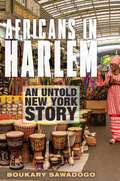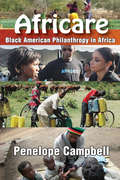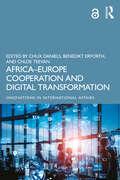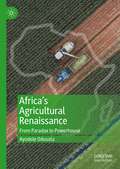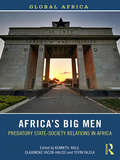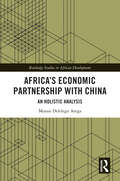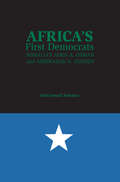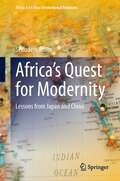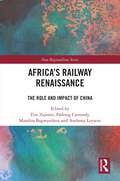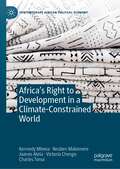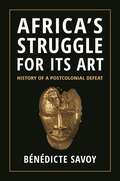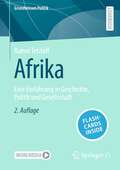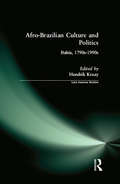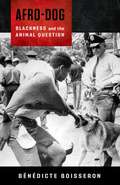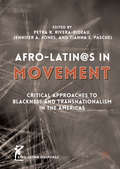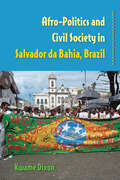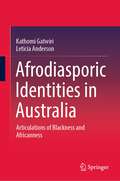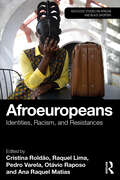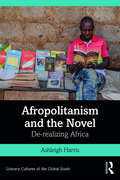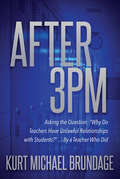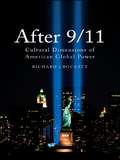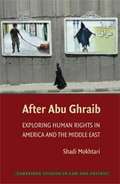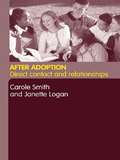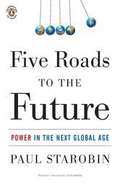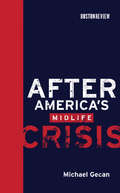- Table View
- List View
Africans in Harlem: An Untold New York Story
by Boukary SawadogoThe untold story of African-born migrants and their vibrant African influence in Harlem.From the 1920s to the early 1960s, Harlem was the intellectual and cultural center of the Black world. The Harlem Renaissance movement brought together Black writers, artists, and musicians from different backgrounds who helped rethink the place of Black people in American society at a time of segregation and lack of recognition of their civil rights. But where is the story of African immigrants in Harlem’s most recent renaissance? Africans in Harlem examines the intellectual, artistic, and creative exchanges between Africa and New York dating back to the 1910s, a story that has not been fully told until now.From Little Senegal, along 116th Street between Lenox Avenue and Frederick Douglass Boulevard, to the African street vendors on 125th Street, to African stores, restaurants, and businesses throughout the neighborhood, the African presence in Harlem has never been more active and visible than it is today. In Africans in Harlem, author, scholar, writer, and filmmaker Boukary Sawadogo explores Harlem’s African presence and influence from his own perspective as an African-born immigrant. Sawadogo captures the experiences, challenges, and problems African émigrés have faced in Harlem since the 1980s, notably work, interaction, diversity, identity, religion, and education. With a keen focus on the history of Africans through the lens of media, theater, the arts, and politics, this historical overview features compelling character-driven narratives and interviews of longtime residents as well as community and religious leaders.A blend of self-examination as an immigrant member in Harlem and research on diasporic community building in New York City, Africans in Harlem reveals how African immigrants have transformed Harlem economically and culturally as they too have been transformed. It is also a story about New York City and its self-renewal by the contributions of new human capital, creative energies, dreams nurtured and fulfilled, and good neighbors by drawing parallels between the history of the African presence in Harlem with those of other ethnic immigrants in the most storied neighborhood in America.
Africare: Black American Philanthropy in Africa
by Penelope CampbellAfricare is a US-based non-profit organization specializing in development aid for Africa. It is also the oldest and largest African-American led organization in the development field. Since its founding in 1970, Africare has delivered more than $710 million in assistance through over 2,500 projects to thirty-six African countries. The organization employs over 1,000 people, largely indigenous to the countries affected.This is a study in leadership and competing African and American black interests. Africare has sought to become the leading voice speaking on Africa within the US, a goal more difficult to attain than becoming the premier NGO in Africa. Sources of opinion and channels of expression about American policy in Africa are fragmented. They do not have name recognition or influential sponsors. There is poor coverage of African affairs in the US, except for key, often tragic, events. Africare has a heritage and has filled a niche in American society. Penelope Campbell argues that unless the organization reclaims these unique assets, it may lose the distinctiveness enabling its survival.The challenge for Africare is spreading its story and message. The author raises disturbing fundamental issues. Has foreign aid become such an industry that the patient is not allowed to get well? As the military cannot afford peace, it seems the world cannot afford the cessation of poverty. Campbell argues that success in Africa has been elusive not because of the failures of development organizations, but the magnitude of the issues involved. The author presents a convincing case for aid to Africa, the pitfalls involved, and for Africare's potential as a leader in meeting the continent's needs.
Africa–Europe Cooperation and Digital Transformation (Innovations in International Affairs)
by Chux Daniels, Benedikt Erforth and Chloe TeevanAfrica–Europe Cooperation and Digital Transformation explores the opportunities and challenges for cooperation between Africa and Europe in the digital sphere. Digitalisation and digital technologies are not only essential for building competitive and dynamic economies; they transform societies, pose immense challenges for policymakers, and increasingly play a pivotal role in global power relations. Digital transformations have had catalytic effects on African and European governance, economies, and societies, and will continue to do so. The COVID-19 pandemic has already accelerated the penetration of digital tools all over the globe and is likely to be perceived as a critical juncture in how and to what purpose the world accepts and uses new and emerging technologies. This book offers a holistic analysis of how Africa and Europe can manage and harness digital transformation as partners in a globalised world. The authors shed light on issues ranging from economic growth, youth employment, and gender, to regulatory frameworks, business environments, entrepreneurship, and interest-driven power politics. They add much-needed perspectives to the debates that shape the two continents’ digital transformation and innovation environments. This book will interest practitioners working in the areas of innovation, digital technologies, and digital entrepreneurship, as well as students and scholars of international relations. It will also be relevant for policymakers, regulators, decision-makers, and leaders in Africa and Europe.
Africa’s Agricultural Renaissance
by Ayodele OdusolaThis book addresses the paradox between preponderance of hunger in a continent that is well endowed with fertile agricultural land, plenty of fresh water and a vibrant labor force. As some statistics show, close to 60% of arable land in the world is located in Africa which also has several rivers flowing in all seasons and plenty of underground water. The bulk of its labor force thrives on agriculture, yet the continent’s largest import item is food. 23 of 36 the most malnourished countries also belong in Africa. This has caused significant needless human suffering. <P><P> This book goes beyond providing the traditional framework of supplying policy recommendations to delivering an applied, innovative framework upon which policymakers, the private sector and international institutions can take clear and deliberate action to stimulate Africa's agricultural sector, thus responding to the 2030 Agenda for Sustainable Development.
Africa’s Big Men: Predatory State-Society Relations in Africa (Global Africa)
by Toyin Falola Kenneth Kalu Olajumoke Yacob-HalisoThis book spotlights, analyzes and explains varying forms and patterns of state-society relations on the African continent, taking as point of departure the complexities created by the emergence, proliferation and complicated interactions of so-called ‘big men’ across Africa's fifty-four states. The contributors interrogate the evolution of Africa’s big men; the role of the big men in Africa’s political and economic development; and the relationship between the state, the big men and the citizens. Throughout the chapters the contributors engage with a number of questions from?different disciplinary and methodological orientations. How did these states evolve to exhibit various deformities in their composition, functioning and in their relations with the societies that they govern? What roles did Atlantic and other slavery and European colonialism play in creating states that are unable to display the right and good relationships with citizens in civil society? Why did these forms of predatory state-society relations continue to thrive in Africa after the end of Atlantic slave trade and subsequent colonialism? Why did the emerging African leaders at independence fail to effectively dismantle the structures of exploitation and expropriation that were the defining features of slavery and colonialism? Who are Africa’s ‘big men’, and what are their trajectories? This book is essential reading for all students and scholars of African politics, public policy and administration, political economy, and democratisation.
Africa’s Economic Partnership with China: An Holistic Analysis (Routledge Studies in African Development)
by Mussie Delelegn AregaThis book examines how increasing Africa-China relations in the fields of trade, development finance and investment have impacted productive capacities and structural economic transformation in sub-Saharan Africa (SSA). The book argues that statistical and empirical evidence shows that China’s influence has not substantially altered the fundamentals in Africa, and instead outlines a framework of policy conclusions and recommendations to help achieve transformational growth and development. Despite increased Chinese investments in transport, energy, communications, and manufacturing, sub-Saharan Africa is yet to see tangible economic and development benefits according to the multidimensional Productive Capacities Index (PCI). External trade is dogged by the same problems as during the colonial era, with primary commodities dominating exports to China, and industrial or manufacturing products dominating imports, thereby leaving the region exposed to external economic shocks. The book considers whether there are lessons to be learned from the experience of Asian countries such as Vietnam, proposing pragmatic, coordinated, non-ideological, and non-confrontational policy approaches to development. This book will be of interest to researchers, policymakers, advisors, academics, and practitioners with an interest in development in Africa, and China’s increasing role in the continent.
Africa’s First Democrats: Somalia’s Aden A. Osman and Abdirazak H. Hussen
by Abdi Ismail SamatarAbdi Ismail Samatar provides a clear and foundational history of Somalia at the dawn of the country's independence when Africa's first democrats appeared. While many African countries were dominated by authoritarian rulers when they entered the postcolonial era--and scholars have assumed this as a standard feature of political leadership on the continent--Somalia had an authentic democratic leadership. Samatar's political biography of Aden A. Osman and Abdirazak H. Hussen breaks the stereotype of brutal African tyranny. Samatar discusses the framing of democracy in Somalia following the years of control by fascist Italy, the formation of democratic organizations during the political struggle, and the establishment of democratic foundations in the new nation. Even though this early state of affairs did not last, these leaders left behind a strong democratic legacy that may provide a model of good governance for the rest of the continent.
Africa’s Quest for Modernity: Lessons from Japan and China (Africa-East Asia International Relations)
by Seifudein AdemThis monograph addresses the complexity of China-Africa and Japan-Africa relations from a comparative perspective. The volume is divided into five sections. Section I focuses on the divergent perspectives that are reflected in the discourse on China-Africa relations. Section II discusses Japan’s economic modernization and its potential lessons for Africa. Section III compares the foreign policies of Japan and China in Africa and analyzes their supposed rivalries on the continent. Section IV explores the relationship between Southeast Asia and China and its relevance to Africa-China relations. Section V provides an in-depth case study of Ethiopia-China relations over the last century. The book fills a major gap in the existing literature on the triad of Africa, China, and Japan. Under the guidance of the disciplines of African studies, international relations, political sociology, and international political economy, this volume elucidates and examines the complexities of the foreign policies of the two Asian powers toward Africa as well as their economic, political, and cultural underpinnings.
Africa’s Railway Renaissance: The Role and Impact of China (New Regionalisms Series)
by Tim ZajontzThis book investigates the history, political economy and spatiality of Chinese railway projects in Africa. It examines the financial governance of Sino-African railway projects, their socio-cultural, political and economic effects as well as the regional dimension of Africa’s new railway architecture and its function within China’s Belt and Road Initiative. Leading and emerging scholars from Africa, China, Europe and the Americas offer interpretations through politico-economic, historical, geographical and post-colonial conceptual lenses. Case studies on projects in Angola, Ethiopia, Kenya, Nigeria, Tanzania and Zambia offer an empirically rich and cross-disciplinary picture of Sino-African railway developments at the micro-, meso- and macro-levels. Regional analyses on West and East Africa expose persistent obstacles to the regional integration of Africa’s railways. The volume outlines opportunities and challenges related to Africa’s railway renaissance in the post-Covid-19 global political economy and will be of great interest to academics, students and practitioners interested in Africa-China relations and their developmental effects or in the politics of infrastructure, spatial governance and the political economy of transport.
Africa’s Right to Development in a Climate-Constrained World (Contemporary African Political Economy)
by Kennedy Mbeva Reuben Makomere Joanes Atela Victoria Chengo Charles TonuiThis book examines how Africa can secure a ‘just transition’ to low-carbon, climate-resilient economies.
Africa’s Struggle for Its Art: History of a Postcolonial Defeat
by Bénédicte SavoyA major new history of how African nations, starting in the 1960s, sought to reclaim the art looted by Western colonial powers For decades, African nations have fought for the return of countless works of art stolen during the colonial era and placed in Western museums. In Africa’s Struggle for Its Art, Bénédicte Savoy brings to light this largely unknown but deeply important history. One of the world’s foremost experts on restitution and cultural heritage, Savoy investigates extensive, previously unpublished sources to reveal that the roots of the struggle extend much further back than prominent recent debates indicate, and that these efforts were covered up by myriad opponents.Shortly after 1960, when eighteen former colonies in Africa gained independence, a movement to pursue repatriation was spearheaded by African intellectual and political classes. Savoy looks at pivotal events, including the watershed speech delivered at the UN General Assembly by Zaire’s president, Mobutu Sese Seko, which started the debate regarding restitution of colonial-era assets and resulted in the first UN resolution on the subject. She examines how German museums tried to withhold information about their inventory and how the British Parliament failed to pass a proposed amendment to the British Museum Act, which protected the country's collections. Savoy concludes in the mid-1980s, when African nations enacted the first laws focusing on the protection of their cultural heritage.Making the case for why restitution is essential to any future relationship between African countries and the West, Africa’s Struggle for Its Art will shape conversations around these crucial issues for years to come.
Afrika: Eine Einführung in Geschichte, Politik und Gesellschaft (Grundwissen Politik)
by Rainer TetzlaffDas Lehrbuch bietet auch in der 2. erweiterten und aktualisierten Auflage einen vertieften Überblick über Geschichte und Politik Afrikas, vom Sklavenhandel, über die Phasen von Kolonialismus und Dekolonisation bis zu den Entwicklungsproblemen der Gegenwart. Dabei werden diverse Entwicklungstheorien zur Erklärung von erfolgreichen und fehlgeschlagenen Entwicklungspfaden einzelner Länder nach 1960 herangezogen. Thematische Schwerpunkte sind Europas koloniales Erbe, Staatsbildung und Staatszerfall, Demokratisierung, Rohstoffpolitik, Bevölkerungswachstum, Hunger und Armut, Kriege und ethnische Konflikte sowie Weltbank, EU, China und Russland als externe Akteure in Afrika.Zusätzliche Fragen per App: Laden Sie die Springer Nature Flashcards-App kostenlos herunter, um Ihr Wissen zu prüfen.
Afro-Brazilian Culture and Politics: Bahia, 1790s-1990s (Latin American Realities Ser.)
by Hendrik KraayThe essays in this book constitute an analytic survey of the last two centuries of Afro-Bahian history, with a focus squarely on the difficult relationship between Afro- and Euro-Bahia and on the continual Afro-Bahian struggle to create a meaningful culture in an environment either hostile or suffocating in its ability to absorb elements of Afro-Bahian culture.
Afro-Dog: Blackness and the Animal Question
by Bénédicte BoisseronThe animal-rights organization PETA asked “Are Animals the New Slaves?” in a controversial 2005 fundraising campaign; that same year, after the Humane Society rescued pets in the aftermath of Hurricane Katrina while black residents were neglected, some declared that white America cares more about pets than black people. These are but two recent examples of a centuries-long history in which black life has been pitted against animal life. Does comparing human and animal suffering trivialize black pain, or might the intersections of racialization and animalization shed light on interlinked forms of oppression?In Afro-Dog, Bénédicte Boisseron investigates the relationship between race and the animal in the history and culture of the Americas and the black Atlantic, exposing a hegemonic system that compulsively links and opposes blackness and animality to measure the value of life. She analyzes the association between black civil disobedience and canine repression, a history that spans the era of slavery through the use of police dogs against protesters during the civil rights movement of the 1960s to today in places like Ferguson, Missouri. She also traces the lineage of blackness and the animal in Caribbean literature and struggles over minorities’ right to pet ownership alongside nuanced readings of Derrida and other French theorists. Drawing on recent debates on black lives and animal welfare, Afro-Dog reframes the fast-growing interest in human–animal relationships by positioning blackness as a focus of animal inquiry, opening new possibilities for animal studies and black studies to think side by side.
Afro-Latin@s in Movement: Critical Approaches to Blackness and Transnationalism in the Americas (Afro-Latin@ Diasporas)
by Petra R. Rivera-Rideau Tianna S. Paschel Jennifer A. JonesThrough a collection of theoretically engaging and empirically grounded texts, this book examines African-descended populations in Latin America and Afro-Latin@s in the United States in order to explore questions of black identity and representation, transnationalism, and diaspora in the Americas.
Afro-Politics and Civil Society in Salvador da Bahia, Brazil
by Kwame Dixon"Powerfully illustrates that Bahia has a vibrant black political history worthy of documentation, re-centering the scholarship on race and politics to the northeast where the black population is the majority."—Keisha-Khan Y. Perry, author of Black Women against the Land Grab: The Fight for Racial Justice in Brazil "English-language work has rarely paid such attention to discourses in Afro-Brazilian communities on civil society inclusion and the process of democratization. This book is a significant contribution to understanding that movement for change and social justice."—Clarence Lusane, author of The Black History of the White House Brazil’s black population, one of the oldest and largest in the Americas, mobilized a vibrant antiracism movement from grassroots origins when the country transitioned from dictatorship to democracy in the 1980s. Campaigning for political equality after centuries of deeply engrained racial hierarchies, African-descended groups have been working to unlock democratic spaces that were previously closed to them. Using the city of Salvador as a case study, Kwame Dixon tracks the emergence of black civil society groups and their political projects: claiming new citizenship rights, testing new anti-discrimination and affirmative action measures, reclaiming rural and urban land, and increasing political representation. This book is one of the first to explore how Afro-Brazilians have influenced politics and democratic institutions in the contemporary period. Publication of the paperback edition made possible by a Sustaining the Humanities through the American Rescue Plan grant from the National Endowment for the Humanities.
Afrodiasporic Identities in Australia: Articulations of Blackness and Africanness
by Kathomi Gatwiri Leticia AndersonThis book explores the Afro-diasporic experiences of African skilled migrants in Australia. It explores research participants' experiences of migration and how these experiences inform their lives and the lives of their family. It provides theory-based arguments examining how mainstream immigration attitudes in Australia impact upon Black African migrants through the mediums of mediatised moral panics about Black criminality and acts of everyday racism that construct and enforce their 'strangerhood'. The book presents theoretical writing on alternate African diasporic experiences and identities and the changing nature of such identities. The qualitative study employed semi-structured interviews to investigate multiple aspects of the migrant experience including employment, parenting, family dynamics and overall sense of belonging. This book advances our understanding of the resilience exercised by skilled Black African migrants as they adjust to a new life in Australia, with particular implications for social work, public health and community development practices.
Afroeuropeans: Identities, Racism, and Resistances (Routledge Studies on African and Black Diaspora)
by Cristina Roldão Raquel Lima Pedro Varela Otávio Raposo Ana Raquel MatiasAfroeuropeans: Identities, Racism, and Resistances reflects on the tensions, ambiguities, and paradoxes of Blackness in Europe.The book addresses relations of domination and modes of racial exclusion, but also Afro-European interventions in the political, social, cultural, and artistic spheres, and the multiple resistances that have sustained Black bodies in the European continent. At the same time as Black histories, cultures, and social conditions are made invisible in hegemonic accounts in Europe, there is a hypervisibility and presence of Black stereotyping in European popular culture. Black identities have become even more conditioned by new mainstream far-right discourses and the tightening immigrant and refugee policies that affect people of African descent. One of the book’s most innovative contributions is the attention it gives to Black South European thought, experiences, and resistance—particularly in the Portuguese context. This constitutes not only a critique Europe’s pervasive racism and "color blindness" policies but also makes a significant contribution to a broader understanding of Blackness and racism, extending beyond the U.S. and Northern European contexts.This book is forged in a moment of particularly strong Black intellectual and political vitality. Given the book’s intersectional and transdisciplinary approach, it will be an important go-to for students and researchers across the humanities and social sciences, as well as to artists, activists, politicians, and journalists.
Afropolitanism and the Novel: De-realizing Africa
by Ashleigh HarrisThe place of the novel as a literary form in Africa is contested. Its colonial origins and its unaffordability for most Africans make it a bad fit for the continent, yet it was also central to the creation of most postcolonial African national literary canons. These bipolar traditions remain unresolved in recent debates about Afropolitanism and the novel in Africa today. This book extends this debate, arguing that Africa’s ‘de-realization’ in global representation and the global economy is reflected in the African novel becoming dominated by Afropolitan, rather than African, aesthetics, styles, and forms. Drawing on close readings of a variety of major African novels of the 2000s, the volume traces the tensions between the novel’s complicity with and resistance to such de-realization. The book argues that current trends and experiments in African non-realist genres, such as science fiction, magical and animist realism, Afro-futurism, and speculative environmentalism, are the result of a preoccupation with such de-realization. The volume is a significant exploration into literary form and its social, philosophical, political, and economic underpinnings. It will be a must-read for scholars, students, and researchers of African literature, politics, philosophy, and culture studies.
After 3PM: Asking the Question: “Why Do Teachers Have Unlawful Relationships with Students?" . . .by a Teacher Who Did
by Kurt Michael BrundageAcross the United States, almost daily, a news story is reported about another teacher who was recently arrested for having an inappropriate relationship with a student. And every time, principals across the country do exactly the same thing: absolutely nothing. After 3PM is an exploration of this damaging epidemic within the school systems — asking the question: &“Why do teachers have unlawful relationships with students?&” ...by a teacher who did.
After 9/11: Cultural Dimensions of American Global Power
by Richard CrockattThis is a readable and incisive analysis of American foreign policy and international politics since the end of the Cold War. It is organized around two key themes, the role of culture in international politics and the changing nature of American power. Richard Crockatt addresses such key issues as: the relationship between US power and the post-Cold War international system US relations with Europe and Islam the intensity of anti-American feeling after September 11th the rebirth of American nationalism the war in Iraq and its aftermath. After 9/11 is a much-needed balanced account of the most significant political questions of the twenty-first century
After Abu Ghraib: Exploring Human Rights in America and the Middle East
by Shadi MokhtariThis book traverses three pivotal human rights struggles of the post-September 11th era: the American human rights campaign to challenge the Bush administration's "War on Terror" torture and detention policies, Middle Eastern efforts to challenge American human rights practices (reversing the traditional West to East flow of human rights mobilizations and discourses), and Middle Eastern attempts to challenge their own leaders' human rights violations in light of American interventions. This book presents snapshots of human rights being appropriated, promoted, claimed, reclaimed, and contested within and between the American and Middle Eastern contexts. The inquiry has three facets: first, it explores intersections between human rights norms and power as they unfold in the era. Second, it lays out the layers of the era's American and Middle Eastern encounter on the human rights plane. Finally, it draws out the era's key lessons for moving the human rights project forward.
After Adoption: Direct Contact and Relationships
by Carole Smith Janette LoganFew children nowadays are placed for adoption with no form of contact planned with birth relatives and it has become common professional practice to advocate direct rather than indirect contact. Practice has outstripped evidence in this respect and not enough is known about how contact arrangements actually work out, particularly for older children adopted from state care. Such children have often experienced neglect, and sometimes abuse, and have frequently been adopted without parental agreement. Based on research with a large number of adoptive parents, children and birth relatives, After Adoption considers the impact of direct post-adoption contact on all concerned in such cases. It also:· discusses the development of adoption policy and law, particularly with regard to the legal and social consequences · reviews the research evidence on adopted children's contact with their birth families· explores through interviews: participants' feelings about adoption and direct contact; their relationships with each other; what hinders and what helps.After Adoption challenges readers to re-think the relationship between adoption and the possibility of direct post-adoption contact and at the same time provides a comprehensive understanding of adoption issues. It is a timely and valuable addition to the literature on adoption, making a substantial contribution to policy and practice.
After America
by Paul StarobinSeasoned correspondent Paul Starobin presents farsighted and fascinating predictions for a new world order in which America is no longer number one.
After America's Midlife Crisis (Boston Review Book)
by Michael GecanA longtime community organizer outlines a way to reverse the fifty-year decline in social mobility and economic progress.Michael Gecan, a longtime community organizer, offers in this book a disturbing conclusion: the kinds of problems that began to afflict large cities in the 1970s have now spread to the suburbs and beyond. The institutional cornerstones of American life are on an extended decline. No longer young, no longer without limitations or constraints, the country is facing a midlife crisis. Drawing on personal experiences and the stories of communities in Illinois, New York, and other areas, Gecan draws a vivid picture of civic, political, and religious institutions in trouble, from suburban budget crises to failing public schools. Gecan shows that the loss of social capital has followed closely upon institutional failure. He looks in particular at the two main support systems of social mobility and economic progress for the majority of working poor Americans in the first half of the last century—the Roman Catholic school system and the American public high school. As these institutions that generated social progress have faded, those depending on social regression—prisons, jails, and detention centers—have thrived. Can we reverse the trends? Gecan offers hope and a direction forward. He calls on national and local leadership to shed old ways of thinking and face new realities, which include not only the substantial costs of change but also its considerable benefits. Only then will we enjoy the next rich phase of our local and national life.
